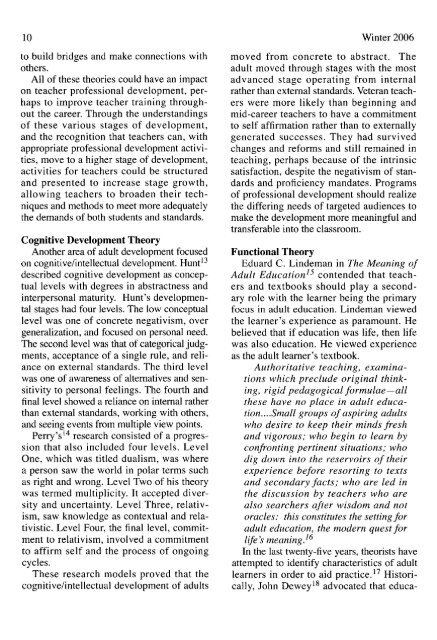Adult Learning Theories Impacting Professional Development Programs
Adult Learning Theories Impacting Professional Development Programs
Adult Learning Theories Impacting Professional Development Programs
Create successful ePaper yourself
Turn your PDF publications into a flip-book with our unique Google optimized e-Paper software.
10<br />
to build bridges and make connections with<br />
others.<br />
All of these theories could have an impact<br />
on teacher professional development, perhaps<br />
to improve teacher training throughout<br />
the career. Through the understandings<br />
of these various stages of development,<br />
and the recognition that teachers can, with<br />
appropriate professional development activities,<br />
move to a higher stage of development,<br />
activities for teachers could be structured<br />
and presented to increase stage growth,<br />
allowing teachers to broaden their techniques<br />
and methods to meet more adequately<br />
the demands of both students and standards.<br />
Cognitive <strong>Development</strong> Theory<br />
Another area of adult development focused<br />
on cognitive/intellectual development. Hunt' 3<br />
described cognitive development as conceptual<br />
levels with degrees in abstractness and<br />
interpersonal maturity. Hunt's developmental<br />
stages had four levels. The low conceptual<br />
level was one of concrete negativism, over<br />
generalization, and focused on personal need.<br />
The second level was that of categorical judgments,<br />
acceptance of a single rule, and reliance<br />
on external standards. The third level<br />
was one of awareness of alternatives and sensitivity<br />
to personal feelings. The fourth and<br />
final level showed a reliance on internal rather<br />
than external standards, working with others,<br />
and seeing events from multiple view points.<br />
Perry's[ 4 research consisted of a progression<br />
that also included four levels. Level<br />
One, which was titled dualism, was where<br />
a person saw the world in polar terms such<br />
as right and wrong. Level Two of his theory<br />
was termed multiplicity. It accepted diversity<br />
and uncertainty. Level Three, relativism,<br />
saw knowledge as contextual and relativistic.<br />
Level Four, the final level, commitment<br />
to relativism, involved a commitment<br />
to affirm self and the process of ongoing<br />
cycles.<br />
These research models proved that the<br />
cognitive/intellectual development of adults<br />
Winter 2006<br />
moved from concrete to abstract. The<br />
adult moved through stages with the most<br />
advanced stage operating from internal<br />
rather than external standards. Veteran teachers<br />
were more likely than beginning and<br />
mid-career teachers to have a commitment<br />
to self affirmation rather than to externally<br />
generated successes. They had survived<br />
changes and reforms and still remained in<br />
teaching, perhaps because of the intrinsic<br />
satisfaction, despite the negativism of standards<br />
and proficiency mandates. <strong>Programs</strong><br />
of professional development should realize<br />
the differing needs of targeted audiences to<br />
make the development more meaningful and<br />
transferable into the classroom.<br />
Functional Theory<br />
Eduard C. Lindeman in The Meaning of<br />
<strong>Adult</strong> Education 15 contended that teachers<br />
and textbooks should play a secondary<br />
role with the learner being the primary<br />
focus in adult education. Lindeman viewed<br />
the learner's experience as paramount. He<br />
believed that if education was life, then life<br />
was also education. He viewed experience<br />
as the adult learner's textbook.<br />
Authoritative teaching, examinations<br />
which preclude original thinking,<br />
rigid pedagogical formulae -all<br />
these have no place in adult education..<br />
.Small groups of aspiring adults<br />
who desire to keep their minds fresh<br />
and vigorous; who begin to learn by<br />
confronting pertinent situations; who<br />
dig down into the reservoirs of their<br />
experience before resorting to texts<br />
and secondary facts; who are led in<br />
the discussion by teachers who are<br />
also searchers after wisdom and not<br />
oracles: this constitutes the setting for<br />
adult education, the modern quest for<br />
life's meaning. 16<br />
In the last twenty-five years, theorists have<br />
attempted to identify characteristics of adult<br />
learners in order to aid practice.1 7 Historically,<br />
John Dewey1 8 advocated that educa-


